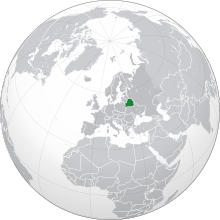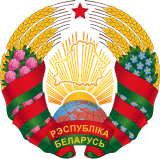
Back تاريخ اليهود في بيلاروسيا Arabic Яўрэі ў Беларусі Byelorussian Жыды ў Беларусі BE-X-OLD Židé v Bělorusku Czech Histoire des Juifs en Biélorussie French יהדות בלארוס HE Židovi u Bjelorusiji Croatian 벨라루스 유대인 Korean Geschiedenis van de Joden in Wit-Rusland Dutch História dos judeus na Bielorrússia Portuguese
This article needs additional citations for verification. (August 2023) |
 | |
| Regions with significant populations | |
|---|---|
| 13,705 (2019) - 70,000 (2014)[1] | |
| 78,859 Belarusian immigrants to Israel (in the years 1989-2013)[2] | |
| Languages | |
| Hebrew, Russian, Yiddish, Polish and Belarusian | |
| Religion | |
| Judaism, Atheism | |
| Related ethnic groups | |
| Jews, Ashkenazi Jews, Sephardi Jews, Mizrahi Jews, Russian Jews, Ukrainian Jews, Lithuanian Jews, Polish Jews, Belarusians | |
| Part of a series on |
| Jews and Judaism |
|---|
| Part of a series on |
| Belarusians |
|---|
 |
| Culture |
| By regions |
| Closely related peoples |
| Religion |
| Languages and dialects |
| Topics |
The history of the Jews in Belarus begins as early as the 8th century. Jews lived in all parts of the lands of modern Belarus. In 1897, the Jewish population of Belarus reached 910,900, or 14.2% of the total population.[3] Following the Polish-Soviet War (1919-1920), under the terms of the Treaty of Riga, Belarus was split into Eastern Belorussia (under Soviet occupation) and Western Belorussia (under Polish occupation), [4] and causing 350,000-450,000 of the Jews to be governed by Poland.[5] Prior to World War II, Jews were the third largest ethnic group in Belarus and comprised more than 40% of the urban population. The population of cities such as Minsk, Pinsk, Mogilev, Babruysk, Vitebsk, and Gomel was more than 50% Jewish. In 1926 and 1939 there were between 375,000 and 407,000 Jews in Belarus (Eastern Belorussia) or 6.7-8.2% of the total population. Following the Soviet annexation of Eastern Poland in 1939, including Western Belorussia, Belarus would again have 1,175,000 Jews within its borders, including 275,000 Jews from Poland, Ukraine, and elsewhere. It is estimated 800,000 of 900,000 — 90% of the Jews of Belarus —were killed during the Holocaust.[6][7][8] According to the 2019 Belarusian census, there were 13,705 self-identifying Jews in Belarus, of which most are of Ashkenazi origin.[9][10] However, the Israeli embassy in Belarus claims to know about 30-50 thousand Belarusians with Jewish descent (as of 2017).[11]
- ^ Israel to sign a visa-waiver program with internationally ostracized Belarus Archived 27 August 2015 at the Wayback Machine By JTA | Sep. 13, 2014
- ^ "Archived copy". Archived from the original on 19 December 2013. Retrieved 13 September 2014.
{{cite web}}: CS1 maint: archived copy as title (link) - ^ "YIVO | Belarus". yivoencyclopedia.org. Archived from the original on 6 July 2010. Retrieved 17 August 2020.
- ^ "Belarus" (PDF). Yad Vashem Shoah Resource Center, The International School for Holocaust Studies. Archived (PDF) from the original on 20 June 2016. Retrieved 17 August 2020.
- ^ "Newsletters - Tools - Belarus SIG - JewishGen.org". www.jewishgen.org. Archived from the original on 29 April 2016. Retrieved 17 August 2020.
- ^ Rudling, Per Anders (2013). Himka, John-Paul; Michlic, Joanna Beata (eds.). Invisible Genocide. The Holocaust in Belarus. Lincoln: University of Nebraska Press. pp. 60–62. ISBN 978-0803246478.
{{cite book}}:|work=ignored (help) - ^ "Belarus marks ghetto's destruction 65 years on". USA Today. Associated Press. 21 October 2008. Archived from the original on 3 April 2016. Retrieved 21 March 2016.
- ^ "Belarus Virtual Jewish History Tour". www.jewishvirtuallibrary.org. Archived from the original on 28 January 2017. Retrieved 17 August 2020.
- ^ [1] Archived July 6, 2011, at the Wayback Machine
- ^ Harshav, Benjamin (1999). The Meaning of Yiddish. Stanford: Stanford University Press. p. 6. "From the fourteenth and certainly by the sixteenth century, the center of European Jewry had shifted to Poland, then ... comprising the Grand Duchy of Lithuania (including today's Byelorussia), Crown Poland, Galicia, the Ukraine and stretching, at times, from the Baltic to the Black Sea, from the approaches to Berlin to a short distance from Moscow."
- ^ Israeli Ambassador: the closure of the embassy in Minsk was refused due to special relations Archived 22 April 2018 at the Wayback Machine Alexey ALEXANDROV / 02/16/2017 / 16:24 / Politics